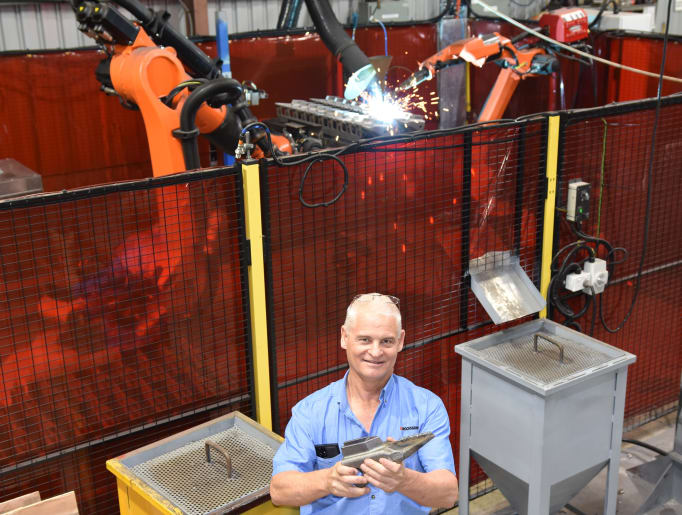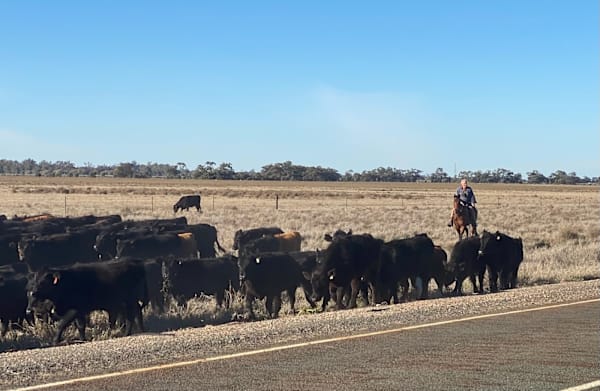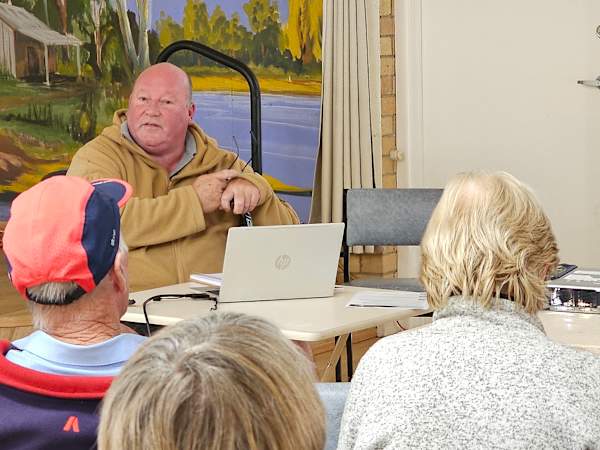WHILE crushing rocky land has proved invaluable for dramatically increasing primary production and land values, it also has been a draining task for operators, however, with the arrival of automation, that’s all about to change.
The Australian-made H4 Reefinator is one machine that has increasingly been spotted working away in rocky paddocks across southern Australia and its adoption could be in for a surge following the recent integration of automation technology.
Developed by Rocks Gone founder and former farmer Tim Pannell, the three-metre wide H4 Reefinator comprises a levelling blade, four front row and five rear row hydraulic tines, and a following ribbed drum, all weighing 28-tonne when filled with water and digging up to 600 millimetres deep.
Pulled by 400-horsepower plus tractors, the rig travels at about 10 kilometres per hour and operators previously had to perform on-the-go depth adjustments according to changes in land and rock conditions.
New automated technology has largely removed that pressure and also added other key benefits.
Latest Stories
The Rocks Gone ‘Depth Master’ auto depth and slip control system calculates speed over ground and tractor load or wheel slip to adjust machine depth up to 50 times per second, as well as the level of its blade.
Operators set the depth and only make a manual adjustment if desired, thereby better optimising machine and tractor performance and resulting in improved crushing results and operational efficiency.
“Before the automation, a lot of input was required and it was quite onerous for operators,” Tim said.
“Now with the Depth Master, they just set the depth and then it’s hands-off.
“You can see everything moving – and the levelling, with the blade going up and down to follow undulating country, is amazing as well.”
On-the-go manual adjustment can still be performed, however full manual use previously could result in operators digging too shallow and limiting optimum tractor and crushing performance.
“It was understandable, because rocky country can be so variable,” Tim said.
“With the Depth Master, you calibrate the system for a start and give it eight to 10 slip scenarios – and you can engage it with the rock more aggressively.
“It better utilises your tractor power because it always senses how hard it is working.
"It saves time because the rig is not stopping occasionally.
"It is mobile all the time and it is crushing much more rock.”
In turn, he said the system reduced tractor tyre wear considerably.
“Wheels can already be spinning with manual operation, whereas the Depth Master senses the load and lifts the machine earlier.
"It might only move one to two centimetres, but that makes a big difference with the load.
"This can double the life of tyres, which we have proven.”
Another benefit with the automation technology, in conjunction with GPS guidance systems, is that it can produce depth maps of worked areas.
“The maps can show perhaps where you may not have been digging deep enough and rather than doing extra passes over the whole area, you may concentrate on some areas and not on others, and effectively do less passes.”
The Depth Master is ISOBUS compatible and suitable for use with John Deere, Case IH and New Holland tractors, while compliance with other tractor brands is continuing to be explored.
Tim said a number of the Depth Master systems, which also can be used with existing H4 Reefinator machines, already were operating in-field with promising results.
“The feedback has been excellent, with operators saying it is an absolute no-brainer,” he said.
Hard-facing replacement parts for the tines and leading edges of the Rocks Gone machines, which are fully tested, also are now completely fabricated using some of the world’s latest automated robotic technology, ensuring precision and uniformity.
“Our latest robot system does everything. It is quite a dynamic process, including automated pre and post heating and lots of little steps to get everything right, and of course it produces extremely consistent results,” Tim said.
Rocks Gone’s Reefinator machines have achieved considerable return on investment for numerous growers across the country, with crop yields more than doubling and land values trebling – and most growers have later sold their machines for more than they purchased them for.
“The laterite rock gets crushed up into silt-like particles and this appears to be really valuable, in addition to reducing the impact on seeding machinery.
"Of course, there is better rooting depth and development, and soil moisture and nutrient retention improves,” Tim said.
“Growers generally spread a couple of tonnes of lime in front of their machines.
“In dirty grass paddocks, they are also improving weed control by ‘reefinating’ during summer, later seeding the rest of their program, and then doing another pass to get a massive weed germination to hit before seeding it last. It is giving them the best, cleanest result.
“The machines are improving saline land as well by increasing soil penetration in land rises.”
He said with the high cost of rural lands today, growers were benefitting by maximising production from their properties and boosting their value.
“Some rural real estate agents are even promoting ‘reefinated’ land with their listings.”
Growers have extra incentive to consider the Rocks Gone machines prior to June 30 this year, with a $37,777 discount on full purchases and the $11,667 Depth Master automation system included for free.
Growers who place a deposit on a full-priced machine by June 30 also receive a free Depth Master system.















